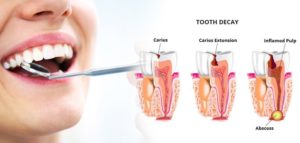
When most people think about Invisalign, what comes to mind is getting a straight smile. However, there are many reasons to request an Invisalign treatment, including but not limited to these three.
Malocclusion: The Imperfect Positioning Of Your Teeth When Your Mouth Is Closed
Malocclusion of the teeth is a misalignment problem that can lead to serious oral health complications. It’s also known as:
- crowded teeth
- crossbite
- overbite
- underbite
- open bite
Malocclusion can be difficult to diagnose in teenagers because the bones of their jaws are still forming, but the degree of future oral misalignment is usually at least partly predictable.
In adults, malocclusion is easier to diagnose and can include teeth that are spaced too far apart, overcrowded teeth, twisted teeth, overbites, and underbites. In both teenagers and adults, Invisalign can help correct Malocclusion by applying steady corrective pressure to reposition the teeth.
Tooth Decay and Gum Disease
When teeth are overcrowded and crooked, they’re difficult to clean. In some cases, teeth are too crowded for even a thin piece of floss to fit between, let alone the bristles of a toothbrush. Not being able to clean teeth properly can lead to periodontal disease or gum disease. And while gum disease is easy to treat in the early stages, if left untreated, it can lead to widespread tooth decay, tooth loss, and other oral health issues.
Speed of Treatment
While treatment time ultimately comes down to the needs of each individual patient, Invisalign is usually the fastest treatment option to straighten a smile. Average treatment time for Invisalign is from 6–18 months, whereas braces take an average of two years.
While wearing Invisalign, Orthodontists recommend eliminating some specific foods and snacks that could compromise the procedure. This includes:
● Sticky candies
● Hard candies
● Popcorn
● Sugary drinks
● Soda
● Coffee
Particles from food left in the mouth can promote the growth of bacteria under the Invisalign trays, which can eventually lead to tooth decay. After eating or drinking, please do not immediately reinsert the trays. Each tray must be cleaned thoroughly, as well as the patient’s teeth. Your orthodontist should have provided you with sufficient cleaning supplies to care for your teeth.
Invisalign does not cause cavities or dental decay. However, it is important for Invisalign patients to understand that the clear aligner trays do prevent saliva movement on the teeth, and hence the breakdown of any particles that remain trapped under the trays.
For this reason, it’s important for patients using Invisalign to thoroughly brush and floss their teeth after every meal. Failing to do so could create areas in which plaque is likely to build up, leading to decay.
As you can see, there are more reasons than just the cosmetic to seek corrective oral treatment with Invisalign.
At Alborzi Orthodontics, we are one of the nation’s leading Invisalign providers.
Call 650-342-4171 to schedule your consultation today!